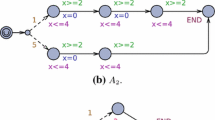Abstract
In this work we present a verification methodology for real-time distributed systems, based on their modular decomposition into processes. Given a distributed system, each of its components is reduced by abstracting away from details that are irrelevant for the required specification. The abstract components are then composed to form an abstract system to which a model checking procedure is applied. The abstraction relation and the specification language guarantee that if the abstract system satisfies a specification, then the original system satisfies it as well.
The specification languageRTL is a branching-time version of the real-time temporal logicTPTL presented in Alur and Henzinger [1]. Its model checking is linear in the size of the system and exponential in the size of the formula. Two notions of abstraction for real-time systems are introduced, each preserving a sublanguage ofRTL.
Similar content being viewed by others
References
R. Alur and T.A. Henzinger. A really temporal logic. 30th IEEE FOCS, 1989.
R. Alur, C. Courcoubetis, and D. Dill. Model-checking for real-time systems. 5th IEEE LICS, 1990.
R. Alur. Techniques for automatic verification of real-time systems. Ph.D. thesis, Stanford University, 1991.
E.A. Emerson, A.K. Mok, A.P. Sistla, and J. Srinivasan. Quantitative temporal reasoning.Workshop on Automatic Verification Methods for Finite-State Systems, Grenoble, France, 1989.
E. Harel. Temporal analysis of real-time systems. M.S. thesis, Weizmann Institute, 1988.
E. Harel, O. Lichtenstein, and A. Pnueli. Explicit clock temporal logic. 5th IEEE LICS, 1990.
R. Alur and T.A. Henzinger. Logics and models of real time: a survey. REX, 1991.
R.P. Kurshan. analysis of discrete event coordination, stepwise refinement of distributed systems. Lecture Notes in Computer Science,Conference Record of the 12th Annual ACM Symposium on Principles of Programming Languages, New Orleans, LA, January, 1985. 430: 414–453 (1990).
G. Shurek and O. Grumberg. The modular framework of computer-aided verification.Workshop on Computer Aided Verification, Rutgers, NJ, June 1990.
O. Grumberg and D.E. Long. Model checking and modular verification.CONCUR, Amsterdam, August 1991.
X. Nicollin and J. Sifakis. The algebra of timed processes ATP: theory and application. IMAG, RT-C26, December 1990.
R. Alur and T.A. Henzinger. Real time logics: complexity and expressiveness. 5th IEEE LICS, 1990.
M.C. Browne, E.M. Clarke, and O. Grumberg. Characterizing finite Kripke structures in propositional temporal logic. Theoretical Computer Science, 59:115–131 (1988).
C. Stirling and D.J. Walker. Local model checking in the modal mu-calculus. TAPSOFT89, March 1989.
R. Cleaveland, Tableau-based model checking in the propositional mu-calculus.Acta Informatica, 27:725–747 (1990).
J. Bradfield and C. Stirling. Local model checking for infinite state spaces.Workshop on Computer Aided Verification, Aalborg, Denmark, July 1991.
A.U. Shankar and S.S. Lam. Time-dependent distributed systems: proving safety, liveness and real-time properties.Distributed Computing, 2:61–79 (1987).
Author information
Authors and Affiliations
Rights and permissions
About this article
Cite this article
De-Leon, H., Grumberg, O. Modular abstractions for verifying real-time distributed systems. Form Method Syst Des 2, 7–43 (1993). https://doi.org/10.1007/BF01383942
Issue Date:
DOI: https://doi.org/10.1007/BF01383942




